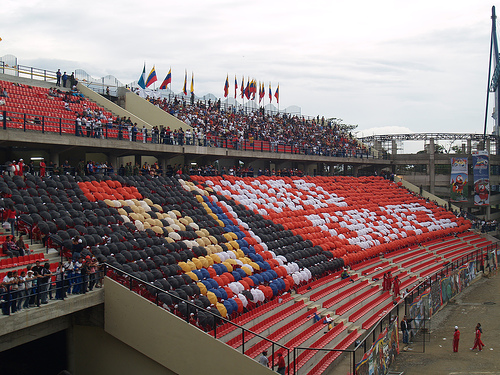Post-Orwellian Venezuela
by Israel Centeno / February 4, 2013 / No comments
A country where truth has leaned more towards morbid gossip than fact.

Chavez supporters at the Estadio Metropolitano de Merida in Venezuela. Photo: Jorge Andrés Paparoni Bruzual, Flickr.
An overanalyzed reality reverberates and generates all kinds of sounds; it creates a racket that has little possibility of articulating the truth harmoniously. Illness and death are common topics in human nature, but within the context of Venezuela, determined by caudillismo and tensions created by political polarization, a relaxed view on such topics is imposed. Nevertheless, the watchword issued by the revolution’s political authorities seems to be: Sow rumor in order to reap victory.
As such, the president-commander’s illness can be read in many ways. The possible consequences and eventual outcome of his condition comprise a log of political dialectics that are disproportionate, aloof, sarcastic and ironic—each one more creative than the last. The core of Chávez’s health situation has been hidden through all the rhetorical figures and winks and frustrations of an oscillating and recurring language. Not surprisingly, the exact details concerning Chávez’s mysterious illness are still unclear. What situation? What illness? What truth are we seeking? Those following Hugo Chávez’s sanctification navigate through all the contradictions of dialectical materialism—a paradox. When trying to respond to everyone’s anxious questions they are hit with an embarrassing certainty: The phenomenological elements needed to prove even the slightest statement are missing. In simple terms, a standard medical exam and a note signed by a doctor would reveal the truth, but, for some time now, the truth in Venezuela has leaned more towards morbid gossip than fact.
The government’s information outlets perform the role of a giant disinformation machine whose sole objective is to dilute and disperse any possibility of establishing an event without ambiguity. The assassination of truth is propagandist’s first objective; to plant ideas and make the masses act in accordance with scenarios prefigured by the political—religious?—operators. Thus, the Ministry of Popular Power for Information and Communication becomes the Ministry of Popular Power for Disinformation and Propaganda.
The strategic, or dramatic, approach seems to be as follows: Turn up the volume on the suffering and probable death of the president-commander, mix up the different layers of reality presented by the Government’s propaganda infrastructure, and employ vicious totalitarian habits to preserve power for the faith of the parishioners and even the self-proclaimed heretics, ultimately creating a shadow play complete with marvels and melodrama. Above all, the plan is to blend until homogenization, an awaited product that has been worked towards and desired by the Chavista status quo. The use and abuse of television and radio for mandatory national broadcasts, civic-military protests, and dramatic exhibitions of contradictions between the Party’s spokespeople on social media, has a predictable political-religous purpose rather than an expected informative function.
An autocratic government that owns all State institutions does not inform the public; it does not tell the truth. No one in its milieu can express ideas freely or spontaneously. Even the leader’s disappearance, and the rumors surrounding his illness, death, and possible resurrection, though they might seem like a paranoid hyperbole written by Orwell, are manipulated by the leader from whichever imagined limbo he finds himself in today, now and forever. Increasing the static and opposing versions of an event has a purpose: To contaminate, as is the custom, any situation that might be moderately acceptable. The objective is to move national interest to wherever might be deemed necessary and convenient by the revolution, the new church and Chávez’s vicars on Earth.
This article was originally published in Spanish in El País on January 14, 2013.




